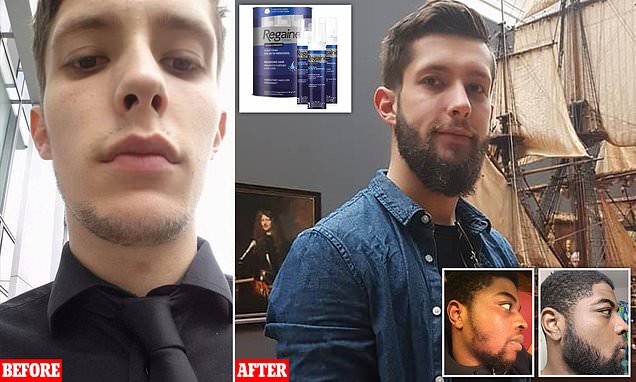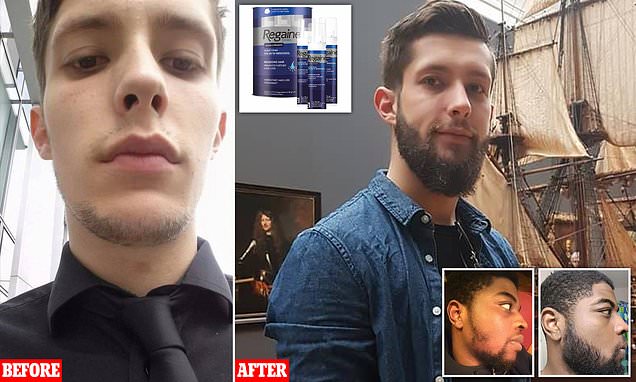Have you ever wondered if certain medications can affect beard growth? Well, at BeardsDude.com, we’ve got all the answers you need. In our articles, we dive deep into the topic of medication and its potential impact on beard growth. We explore different medications and their potential effects on the hormones and processes that contribute to beard growth. Whether you’re taking prescription medications or over-the-counter drugs, we’ve got you covered with comprehensive information and insights. So, if you’re curious about how your medications might be affecting your beard, keep reading to learn more!
At BeardsDude.com, we understand that medications can have a significant impact on our bodies, and it’s crucial to be aware of any potential consequences. In our articles, we discuss medications that are known to interfere with the hormones responsible for beard growth. We provide in-depth explanations of how these medications work and the potential effects they can have on your beard. If you’re concerned about your medication’s impact on your beard growth, we offer tips and suggestions on how to manage these effects and promote healthy beard growth.
We also want to emphasize that everyone’s body is different, and the impact of medications on beard growth can vary from person to person. That’s why it’s important to consult with a healthcare professional or a specialist if you have any concerns or questions about medication and beard growth. Our articles provide valuable information, but they shouldn’t replace personalized medical advice. So, if you’re unsure about how your medications might be affecting your beard, don’t hesitate to reach out to a medical professional. They can provide you with the guidance and support you need.
In conclusion, if you’re curious about the potential effects of medications on your beard growth, BeardsDude.com is the place to be. We offer detailed articles and insights that cover a wide range of medications and their potential impact on beard growth. Remember, understanding the potential effects of medications is essential for maintaining a healthy and thriving beard. So, keep reading our articles to learn more about this fascinating topic!

Understanding the Impact of Medications on Beard Growth
Beard growth is a natural process influenced by several factors, including genetics, hormones, and overall health. While genetics and hormones play a significant role in determining the thickness and growth rate of your beard, it’s essential to consider the impact of certain medications on beard growth.
Medications, whether prescribed or over-the-counter, can have various effects on the body, including the potential to inhibit beard growth. The mechanisms through which medications may affect beard growth can vary, and it’s crucial to be aware of the potential side effects.
Common Medications That Can Affect Beard Growth
Many medications have been associated with potential effects on beard growth. These include:
1. Steroids
Steroids, particularly anabolic steroids used for performance enhancement, have been linked to increased facial and body hair growth. However, it’s important to note that the use of anabolic steroids for non-medical purposes is illegal and can have severe adverse effects on health.
2. Antidepressants
Some antidepressant medications, such as selective serotonin reuptake inhibitors (SSRIs), have been reported to affect hair growth. While the exact impact on beard growth may vary, it’s advisable to discuss any concerns with your healthcare provider.
3. Blood Pressure Medications
Certain blood pressure medications, such as beta-blockers and ACE inhibitors, have been associated with hair loss. While the impact on beard growth may not be as well-studied, it’s important to be aware of these potential side effects.
4. Chemotherapy Drugs
Chemotherapy drugs are known to cause hair loss, including facial hair. If you are undergoing chemotherapy, it’s likely that your beard growth will be affected. However, it’s important to prioritize your overall health and consult with your healthcare team about any concerns.
5. Acne Medications
Certain acne medications, such as isotretinoin (Accutane), have been associated with hair loss and altered hair growth patterns. If you are using acne medications and notice changes in your beard growth, it’s best to seek advice from a dermatologist.

How Medications Can Inhibit Beard Growth
The ways in which medications can inhibit beard growth can vary depending on their mechanisms of action and their impact on the body’s hormonal balance. Certain medications can disrupt the normal functioning of hormones, such as testosterone, which is crucial for beard growth.
For example, some medications can inhibit the production of testosterone or interfere with the conversion of testosterone to its active form, dihydrotestosterone (DHT). Both testosterone and DHT play a crucial role in promoting facial hair growth.
Additionally, certain medications can affect the hair follicles directly, leading to thinner, weaker hair growth or even hair loss. These medications may disrupt the normal growth cycle of hair follicles, leading to a reduction in hair density and thickness.
The Role of Hormonal Medications in Beard Growth
Hormonal medications, such as those used for hormone replacement therapy or certain hormonal contraceptives, can also have an impact on beard growth. These medications can modify the hormonal balance in the body, potentially affecting the growth and density of facial hair.
It’s essential to consider the potential side effects of hormonal medications and discuss any concerns with your healthcare provider. They can provide personalized advice based on your specific situation and help you understand the potential impact on beard growth.

Effects of Antibiotics and Other Medications on Beard Growth
While antibiotics are not directly linked to beard growth inhibition, they can indirectly impact beard growth by affecting overall health and immune function. Antibiotics may disrupt the balance of bacteria in the gut, which can have a cascading effect on various bodily functions, including hair growth.
Furthermore, certain medications, such as those used to treat autoimmune conditions or chronic diseases, can also have an impact on beard growth. These medications may suppress the immune system or interfere with other biological processes, potentially affecting the health and growth of facial hair.
Specific Medications and Their Effects on Beard Growth
Steroids and Beard Growth
Anabolic steroids, which are often misused for non-medical purposes, are known to increase testosterone levels in the body. As a result, they can promote hair growth, including facial hair. However, the use of anabolic steroids without medical supervision can have severe health consequences and should be avoided.
Antidepressants and Beard Growth
The impact of antidepressant medications on beard growth can vary. While some individuals may notice no significant changes in their beard growth while taking these medications, others may experience alterations in hair growth patterns. It’s best to consult with your healthcare provider if you are concerned about the effect of antidepressant medications on your beard growth.
Blood Pressure Medications and Beard Growth
Certain blood pressure medications, such as beta-blockers and ACE inhibitors, have been associated with hair loss. While the impact on beard growth specifically may not be well-documented, it’s important to be aware of these potential side effects and discuss any concerns with your healthcare provider.
Chemotherapy Drugs and Beard Growth
Chemotherapy drugs are well-known for their side effect of causing hair loss, including facial hair. If you are undergoing chemotherapy, it’s expected that your beard growth will be affected. However, it’s crucial to prioritize your overall health and consult with your healthcare team regarding any concerns.
Acne Medications and Beard Growth
Some acne medications, such as isotretinoin (Accutane), have been associated with hair loss and altered hair growth patterns. If you are using acne medications and notice changes in your beard growth, it’s best to seek advice from a dermatologist. They can provide guidance on managing potential side effects and offer alternative treatment options if necessary.

Tips and Techniques for Maintaining Beard Growth While on Medications
If you are taking medications that may potentially affect beard growth, there are several tips and techniques you can employ to support and maintain healthy beard growth. While these strategies may not counteract the direct effects of medications, they can help optimize overall beard health.
Consulting Your Doctor or Dermatologist
It’s crucial to consult with your healthcare provider or a dermatologist if you have concerns about the impact of your medications on beard growth. They can provide personalized advice based on your specific situation and help you understand the potential effects of medications on your beard growth.
Understanding Potential Side Effects
Take the time to understand the potential side effects of the medications you are taking. Being aware of these side effects allows you to monitor changes in your beard growth and seek timely medical advice if necessary.
Adjusting Your Beard Care Routine
Maintaining a consistent beard care routine can help optimize beard growth and overall beard health. This includes regular washing, conditioning, and moisturizing your beard. Additionally, keeping your beard well-groomed through regular trimming can ensure that it looks its best despite potential growth limitations.
Using Supplemental Products to Support Beard Growth
There are various supplemental products available on the market that claim to promote beard growth. While the effectiveness of these products may vary, some individuals have reported positive results. These products often contain ingredients such as biotin, vitamins, and essential oils that are believed to support hair growth.
It’s essential to note that the scientific evidence supporting the efficacy of these products is limited, and individual results may vary. However, if you are interested in trying such products, ensure they are reputable and consult with your healthcare provider to determine if they are suitable for you.
Implementing Lifestyle Changes to Promote Beard Growth
Certain lifestyle factors can influence overall beard growth and health. These include maintaining a balanced diet rich in vitamins, minerals, and protein, staying hydrated, exercising regularly, and reducing stress levels. While these lifestyle changes may not directly counteract the impact of medications, they may contribute to overall beard health and optimize growth potential.
Natural Alternatives to Medications for Beard Growth
If you are concerned about the potential effects of medications on beard growth, you may consider exploring natural alternatives. While no natural remedy can replace the effects of prescribed medications, some individuals have reported positive results with certain approaches. It’s important to note that the scientific evidence supporting these alternatives is limited, and individual results may vary.
Nutritional Supplements for Beard Growth
Certain nutritional supplements, such as biotin, collagen, and vitamins like Biotin, Vitamin E, and Vitamin D, are believed to support hair growth. However, it’s crucial to consult with your healthcare provider before starting any new supplements, as they can interact with medications and have potential side effects.
Herbal Remedies for Beard Growth
Herbal remedies, such as saw palmetto extract, pumpkin seed oil, and nettle root extract, have been traditionally used to support hair growth. While individual experiences may vary, it’s important to approach such remedies with caution and consult with your healthcare provider before use.
Aromatherapy and Essential Oils for Beard Growth
Certain essential oils, such as cedarwood, rosemary, and peppermint oil, have been believed to promote hair growth. However, it’s important to ensure that essential oils are used safely and in appropriate dilutions. Some essential oils can cause skin irritation and other adverse reactions if used improperly.
Topical Treatments for Beard Growth
There are various topical treatments available on the market that claim to promote beard growth. These treatments often contain ingredients like minoxidil, which is an FDA-approved topical medication for hair loss. However, if you are considering using such treatments, it’s advisable to consult with a dermatologist to ensure their safety and suitability for your specific situation.

The Importance of Patience and Consistency in Beard Growth
Whether or not you are taking medications that may affect beard growth, it’s crucial to understand that beard growth is a process that requires patience and consistency. Beard growth rates can vary significantly among individuals, and it’s important to recognize and respect your unique growth pattern.
Recognizing the Individual Variations in Beard Growth
Every individual’s beard growth pattern is unique, and it’s essential to accept and embrace the natural variations. Some individuals may experience rapid and thick beard growth, while others may have a slower growth rate or a patchy beard. It’s important not to compare your growth to others and instead focus on nurturing your own beard journey.
Understanding the Average Beard Growth Rate
On average, facial hair grows at a rate of about half an inch per month. However, it’s essential to remember that this is just an average, and individual growth rates can vary significantly. If you feel like your beard growth is slower than average or not meeting your expectations, it’s best to consult with a healthcare provider or a dermatologist who can provide personalized advice.
Maintaining a Consistent Beard Care Routine
Consistency is key when it comes to maintaining healthy beard growth. Establishing a regular beard care routine and sticking to it can help optimize beard health and growth potential. This includes washing, conditioning, moisturizing, and styling your beard regularly, as well as trimming and shaping it when necessary.
Staying Motivated and Patient During the Beard Growth Process
Beard growth is a journey that requires patience and perseverance. It’s important to stay motivated and embrace the process, even if you encounter challenges or setbacks. Remember that beard growth takes time, and results may not be immediate. Stay committed to your beard care routine, consult with professionals when needed, and celebrate every milestone along the way.
Conclusion
Growing and maintaining a beard is a deeply personal journey that can be influenced by various factors, including medications. While certain medications can potentially affect beard growth, it’s important to prioritize your overall health and well-being when making decisions regarding medications.
If you have concerns about the impact of your medications on beard growth, consult with your healthcare provider or a dermatologist. They can provide personalized advice and guidance based on your specific situation.
Embrace the uniqueness of your own beard growth journey and focus on maintaining a consistent beard care routine. Consider incorporating lifestyle changes and natural alternatives to enhance overall beard health and growth potential.
At BeardsDude.com, we are here to support and empower individuals on their beard journey. Join our thriving community and celebrate the wonderful, multifaceted world of beards together. Remember, a beard is not just facial hair; it’s a lifestyle, a statement, and a celebration of self-confidence.
